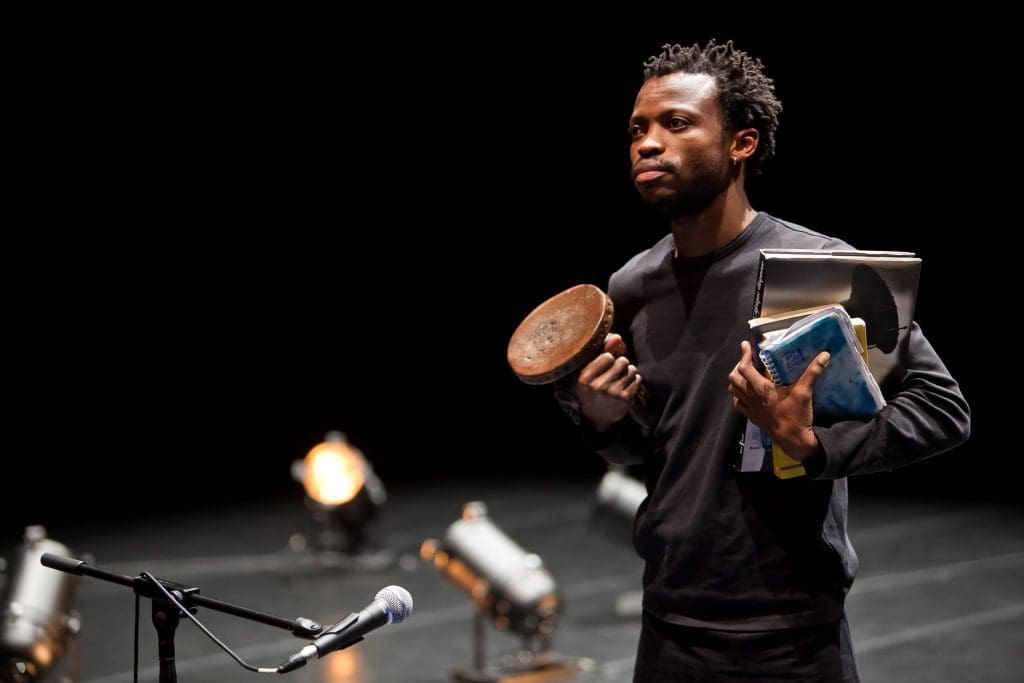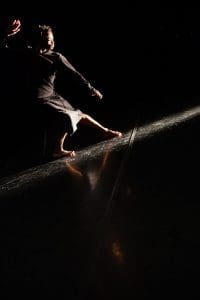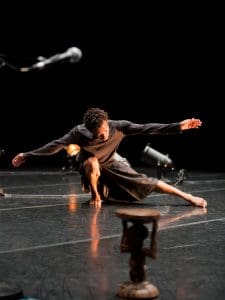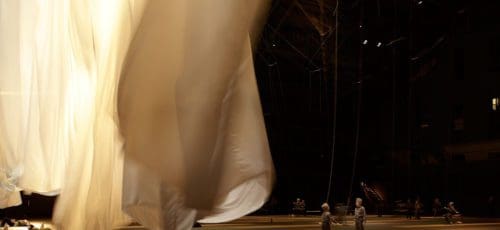Memories of Dance: An Interview with Faustin Linyekula
Faustin Linyekula is a renowned Congolese dancer and choreographer, and the founder of Studios Kabako, based in Kisangani. Le Cargo, Linyekula’s first and only solo dance piece, finds him adopting the roles of storyteller and dancer in tandem as he leads his audience on an arresting and deeply personal journey to his homeland—a country marked by decades of violence and unrest that persists to this day—in search of a dance from his childhood that has since been erased. FringeArts recently spoke with Linyekula about the origins of the piece and the role of the storyteller in performance.
FringeArts: What is the origin of the title Le Cargo?
Faustin Linyekula: Le Cargo was initially the title of a carte blanche given to me by the Centre National de la Danse in France in 2003. We proposed, over 4 days, a cargo full of artists and artistic proposals from the African continent. I wanted to call it “Cargo nègre” but it was too polemical for a public institution. I kept this title for the solo. It refers to the idea of (shameful?) trade, (easy?) exoticism, travel, and to this journey into my oldest memories of dance.
FA: Can you discuss some of the background of the piece?
Faustin Linyekula: I have never made any solo. Until today, I have only created this very solo simply because I believed and I still believe that the whole point of making work is not to be alone. It’s actually to try and find a place where you share something with people. You doubt together. You dream together.
So it was only in 2011 that I created my first solo. This was my way of celebrating the tenth anniversary of our company, the Studios Kabako, in the Congo. So it was a way of asking myself, “What’s next?”
FA: How did you transform so much personal and national memory and history into art?
Faustin Linyekula: I don’t have so much imagination, so I take what is around me, what life gives to me.
In Le Cargo, I am just telling a very personal and intimate story from Congo of course, as I am obsessed with stories from Congo. I’m known as a dancer, a choreographer, but I like introducing myself as a storyteller. And the kind of stories that set me in motion, I understood it fifteen years ago, are not stories from exile. And yet, I’m very sensitive to the question of exile: intellectual exile, emotional, political. But when it came to creating work, that was never really what was coming forth. So, having left the country in the 90s, I decided to go back to DRC in 2001—simply because this is the country where I was born and grew up—and started telling stories of Congo: how history has affected lives, souls, and bodies of my friends and the people around me; how the history of my country can be understood in the evolution of the forms of violence that have been made to these bodies.
FA: How do you perceive the audience when you are performing?
Faustin Linyekula: Theater is about relationship, meeting and negotiating. Negotiating with myself first, because I need to understand: Who am I? Where am I? Where am I going to? Then it’s about negotiating with my companions on stage and of course with the audience. What I like about storytellers is how they start with the audience in the here and now, then they bring them on this journey to another time and space, but then, and this is most important, they gently bring people back to the here and now so the journey can continue in “real” life.
FA: What are some of the items you have on stage with you?
Faustin Linyekula: I have just a Luba stool and some books of thinkers and poets whose words and positions have influenced my own way of seeing life.
FA: What did you work most on when fine tuning the piece?
Faustin Linyekula: I am very passionate about sound, recording and mixing in the studio we have in Kisangani, so I took a great care about the soundtrack.





